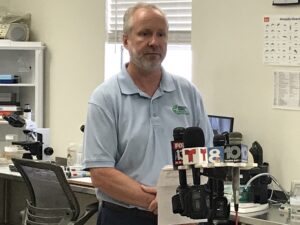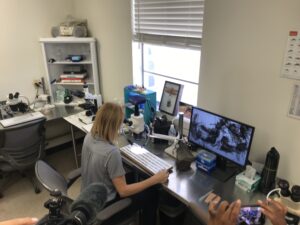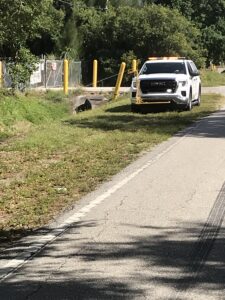Among their chief concerns: Dengue and malaria.
By Johannes Werner
Original Air Date: May 10, 2024
Host: The daily rains will begin soon, and that means mosquito season is upon us. This comes after the malaria outbreak in Sarasota County last year, which raised fears about a tropical disease that – once contracted – can cripple people for life. Malaria affects mostly homeless people and outdoor workers. On the other hand, the extended spraying campaign that ensued also raised anxieties among food growers, parents and pet owners. Our news team visited Sarasota County Mosquito Control to find out what we should expect this rainy season.
Johannes Werner: Last fall, we had the first outbreak of malaria in the continental United States since 2003. The Centers for Disease Control reported seven cases of locally contracted cases, all of them at or near the DeSoto Acres and Kensington Park neighborhoods in north Sarasota County.
In response, Sarasota County Mosquito Control went all out. There were intense public appeals to eliminate standing water in yards; county workers pulled weeds from ponds and lakes; the county offered property owners mosquito fish to place in ponds; and county workers intensified their larvicide campaign, using bacterial bio-agents. Sarasota County also extended its herbicide spraying campaign, using airplanes and trucks to kill adult mosquitos. That campaign lasted well into December, much longer than usual. All this apparently did the trick and prevented the spread of malaria, at least for now.
So what should we expect this season? It’s not only malaria. Dengue, another tropical disease that has been spreading in the Caribbean and Mexico lately, also has the mosquito controllers concerned. While there is no evidence of outbreaks in Florida right now, they will be watching closely once the rains begin. Sarasota Mosquito Control chief Wade Brennan:

Wade Brennan
Wade Brennan: We always have different things that are posing threats to the United States. Last year in Sarasota County, we had malaria locally transmitted. That could happen again this year, or any year. It’s what we’re here for. We also have the risk of dengue being spread in different areas throughout the state. Currently there is no activity of local transmission of malaria or dengue, which is great, but our eyes are always open on the situation.
JW: Brennan gave a summary of the massive scale of the work Mosquito Control is doing. But none of this can make people safe from mosquito-borne disease, unless we take action ourselves.
WB: When it comes to mosquito season, with all of our efforts — last year we treated over 580,000 acres, we also treated over 2,400 miles of ditches — with all those efforts, we still cannot reduce the risk of mosquito, arboviruses, and parasites to the public completely. That’s our primary focus; we do everything we can, but we still need the public’s help. Ways that everybody can help us out on that is making sure to get rid of all containers on your property. Also, avoid mosquito activity at dawn and dust. That’s the primary activity times for mosquitoes feeding on humans. The other thing is if you are gonna be outside, wear those repellents, they are very effective. And also at the same time, wear long loose fitting clothing. That’s long sleeves, long pants. This is important to stop all those mosquito bites.
JW: So what’s news? Sarasota Mosquito Control is getting into drone apps to detect problem areas. Also, a shiny new Mosquito Control headquarters building is going up in Venice, replacing the low-profile barracks in an industrial area near Clark Road. Wade Brennan:

Mosquito Control lab.
WB: With that new facility, we’re hoping to have a much larger aquaculture. So we’re going to have more fish available. We’re also going to have a very large live wall that’s going to naturally filter that water, so we’re not wasting that water and dumping it into storm water systems. We’re also going to be having better chemical or pesticide storage capabilities, to where we’ll have longer longevity and efficiencies with our bacterial larvae sites.
JW: The adulticide spraying was the most controversial aspect of the county’s anti-malaria campaign. Last fall, WLSR listeners repeatedly made us aware of moments when they were caught unaware, getting dusted when returning from work, raising concerns about dogs, cats and chickens, and about backyard food crops. Those campaigns are routine from June through October, Brennan says, and will continue.

Sarasota County Mosquito Control truck, spraying pesticide.
WB: So we always do large adulticide spraying when the mosquito populations start peaking, especially in June all the way to the end of October, sometimes November, like we just experienced this last year. So it’s all determined based on the actual active mosquito population.
JW: Last fall, there were three to four spraying campaigns per week. The county gives same-day notice to residents in affected areas, using a texting and email system people can opt in to. Obviously, there are many ways timely information can fall through the cracks.
The main concern raised by listeners is about the types of pesticides Mosquito Control uses. County spokeswoman Sara Nealeigh provided us with a six-page list of chemicals approved for use in Sarasota. Those approved for aerial and ground spraying are Deltamethrin, Etofenprox, Naled, Permethrin, Piperonyl Butoxide, Sumithrin, and Pallethrin. Both Naled and Etofenprox are banned by the European Union. Etofenprox is highly toxic to aquatic life, and both chemicals have raised concerns about their impact on children.
Asked which ones are most used in Sarasota County’s aerial and ground spraying, Nealeigh said Mosquito Control consistently rotates chemicals, to prevent mosquito immunity.
To get the full list of pesticides used by Sarasota County, send an email to news@wslr.org.
Reporting for WSLR News from Sarasota, this has been Johannes Werner.
WSLR News aims to keep the local community informed with our 1/2 hour local news show, quarterly newspaper and social media feeds. The local news broadcast airs on Wednesdays and Fridays at 6pm.